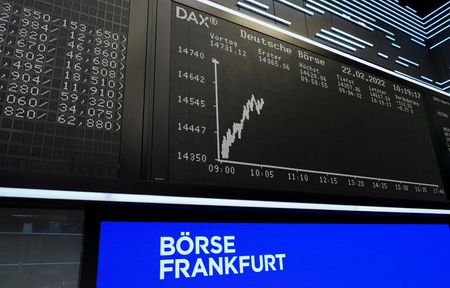 1
1 1
1

By Samuel Indyk
LONDON (Reuters) – European shares were mostly higher on Friday as investors await a key jobs report that will help gauge the strength of the U.S. economy and provide hints on the pace of the Federal Reserve’s policy tightening in the second half of the year.
The pan-European STOXX 600 was up 0.16% after a strong trading session in Asia-Pacific overnight and following a positive session on Wall Street.
MSCI’s world equity index, which tracks shares in 50 countries, was up 0.17% and on track for its second consecutive weekly gain after seven weeks of losses.
Japan’s Nikkei 225 rose 1.27% and Australia’s resource-heavy ASX 200 finished higher by 0.88%.
Markets in China, Hong Kong and the UK are closed for public holidays.
Investors are looking ahead to the U.S. Labor Department’s comprehensive employment report, due at 1230 GMT, for any hints of a slowdown in the jobs market, which might give the Fed an option to slow or even pause interest rate hikes in the second half of the year.
“Employment will matter more in the coming months because income and job security will matter more,” said UBS GWM Chief Economist Paul Donovan, who added that consumption will be dictated by income—or income plus access to credit.
“As demand normalizes, whether firms start firing workers will matter to the balance of consumer spending and saving,” Donovan added.
A Reuters poll of analysts expects 325,000 nonfarm payrolls were added in May, with average earnings slowing to 5.2% on a yearly basis, from 5.5% in April.
Balancing the growth and inflation outlook is a big worry for central bank policymakers as they look to avoid a hard landing and tipping economies into recession.
Euro zone inflation rose to another record high in May which markets see as a challenge to the European Central Bank’s view that gradual rate increases will be enough to tame fast price growth.
“The eurozone inflation number was one confirmation that even the ECB is now forced, even though they are facing a probable recession, to hike rates, perhaps faster or more aggressively than previously expected,” said Jeroen Blokland, Head of Research at investment research platform True Insights.
“I could imagine that we will retest the lows somewhere in the coming weeks, perhaps months,” Blokland added.
Money markets have now fully priced in a 25 basis point interest rate hike from the ECB at its July meeting, with around 124 basis points of tightening priced by the year-end, equivalent to almost five 25 basis point increases.
Markets have also locked in consecutive 50 basis point Fed hikes in June and July, but there remains uncertainty about what happens after that.
European government bonds were marginally higher with thinner trading volumes than usual given the public holidays.
Germany’s 10-year government bond yield was up 2 basis points at 1.247% after briefly hitting a new eight-year high of 1.263% earlier in the session.
Italy’s 10-year yield was seen briefly spiking in earlier trade, but with futures markets barely moved traders said this was driven by a lack of liquidity in cash bonds on Friday.
The U.S. dollar edged lower as traders await the U.S. jobs report.
The dollar index, which measures the greenback against a basket of six major currencies, was lower by 0.08% at 101.68.
Oil prices declined as markets adjust to the decision by oil-producing countries OPEC+ to boost production.
Brent futures were lower by 1.2% at $116.25 per barrel, while U.S. West Texas Intermediate crude fell 1.3% to $115.38.
Gold prices dipped 0.1% having earlier touched $1,873 per ounce, the highest level since May 9.
(Reporting by Samuel Indyk in London, additional reporting by Kanupriya Kapoor in Singapore; Editing by Christina Fincher)